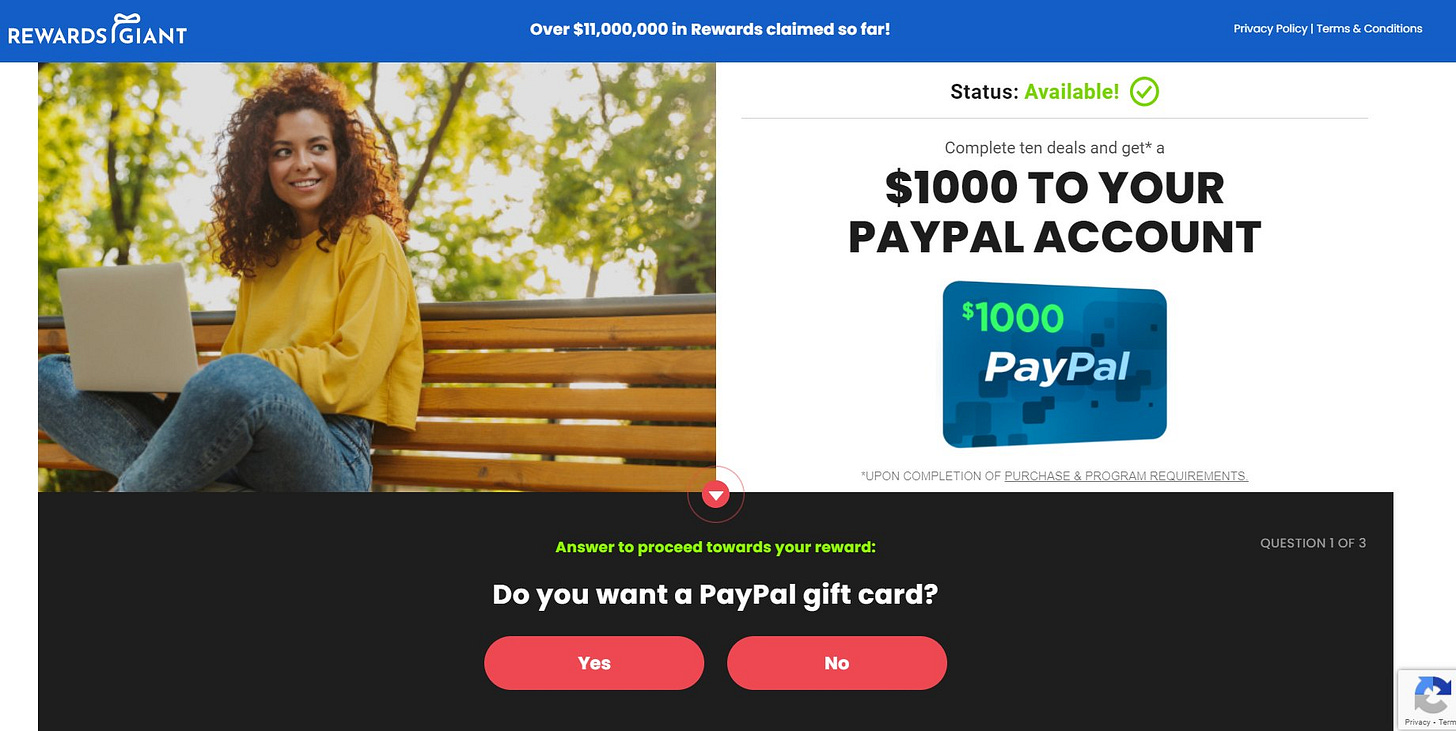Scam Ads: MrBeast Isn't Giving Away $10k, And Cory Doctorow Is No Luddite
Scams promoted with advertising have gone on since time immemorial. Most of this discussion will center around digital advertising, but not all advertising is online, including ads for scams.
To hear the article read by AI click here.
Nearly everyone who's incorporated a business in the United States has been mailed an advertisement attempting to collect some form of fee in exchange for an official-sounding non-service. Going back to filing my first LLC, I've gotten letters that look official, trying to collect between $50 up to a few hundred dollars from the new company. These letters always walk the line of claiming to be a government agency, but they are ads.
Local media in Harrisburg, Pennsylvania covered one of these business letter grifts back in 2020. The scammers know that a company has just been filed, the name of that company, and the address of that company from public records. That's a lot of information to make specific creative. A letter to the registered address, using the company name, and the registered contact's name to demand the purchase of an official-sounding certificate is as specific as it is deceptive.
If you're not bothered by scams targeting businesses, remember not every company is Johnson & Johnson creating a new firm to avoid a judgment. Massive evil firms and others spinning up a labyrinth of LLCs for liability and tax mitigation aren't falling for this. These scams are hitting mom & pop restaurants, and the artist trying to collect a few thousand dollars a year without handing out a social security number.
Online Ads Shenanigans
The principles of being deceptive and specific underpinning a business letter extortion racket are easy to implement online. I've worked in advertising for over a decade; online ads targeting gets crazy detailed. Talking about data brokers is out of scope for this article; but remember Facebook ads for T-shirts with people's last names on them? Yeah, in the world of creepy online ads targeting, those are a party trick.
On Twitter and in a blog post, Cory Doctorow highlighted a scheme using fairly simple ad targeting and creative taking advantage of restaurants and their customers. I'm calling this a scheme, not a scam because while It's deceptive, objectionable, and scummy, it isn't as blatantly evil as a fraud ad I'll point to later.


In this scheme, someone created a clone of a real restaurant’s website. That clone website was promoted with an ad on Google Search for the restaurant’s name. When Doctorow clicked the ad and placed the order, the fake site placed an order under his name with the real restaurant, charging him a 15% markup.
While this is all incredibly parasitic, it’s seemingly soft as fraud goes. Yes, the fake website was impersonating the real restaurant and taking money for nothing. But I have no evidence that this particular website was used to steal credit card data, and clearly, the fake site was at least attempting to complete the orders placed.
In Doctorow’s story, things worked out. The real restaurant called him, to let him know they canceled the order placed by the fake site.
Even “reputable” food delivery companies like DoorDash, Grubhub, and Postmates have all scraped restaurant menus from the internet, adding them to the respective delivery platform without permission. Sometimes these platforms are even willing to lose money on the transaction to create growth; take a look at Ranjan Roy’s classic pizza arbitrage article for an example. Sometimes delivery platforms even create fake websites for restaurants, much like the one Doctorow found.
When an upstart restaurant I worked with tried to register a trademark for their name a parasite bought the dot com domain name. I spent over 100 hours dealing with ICANN’s Uniform Domain-Name Dispute-Resolution and communicating the process with the client. Yes, they should have picked up the domain name before filing the trademark, but don’t excuse the parasites who squat domain names in response to legal filings.
From Scheme To Scam
In 2021 I Tweeted about seeing ads on YouTube impersonating MrBeast, an entertainment sensation who currently has 136 million subscribers, who at the time had a mere 80 million subs. MrBeast is known for huge giveaways; collectively his videos have given away many tens of millions of dollars.
The YouTube ad shows Jimmy Donaldson, the face of MrBeast, claiming to give away “10000$ to every person who visit this page[sic]”. The ad should set off red flags, but this isn’t nearly so ridiculous as the old Bill Gates chain emails people fell prey to for a decade.


That ad drove to mrbeast-giveaway dot com a landing page prompting people to click a button and enter some information to claim their reward. Clicking the button drove to Rewards Giant (now called Level Up Rewards Program). Rewards Giant is probably a scam, if legit it purports to let people take surveys, download & play mobile games, and other such tasks to earn points that can be redeemed for gift cards.
Even if Rewards Giant were a legitimate company, the offer is a far cry from MrBeast giving away money to fans. It’s deceptive and predatory. The MrBeast (like all other creators) team have very few tools available to police or even track this problem. For now the most creators can do is Tweet warnings about scams.
Get Mad
I could show many more examples of illegitimate ads falling all over the scam continuum. But no one wants to read a 10,000-word article showing every valueless course or webpage that takes payment for parking tickets that don’t exist. Perhaps you’ll just believe me when I say scams are advertised on every platform.
Every digital advertising platform wants more revenue and less expense. Policing ad quality is an expense, whereas advertising, whether the purpose is legitimate or not, generates revenue. Only when the economic incentives shift due to public outrage, demands from large advertisers or investor pressure will the companies in a position to stop advertisements of scams do something.
Scams promoted with advertising have gone on since time immemorial. It takes a lot to get media coverage or regulatory action. The general public often reacts to hearing about a scam by blaming the victim’s stupidity. If you want the ads to stop, get mad. We know how the world is right now; let’s push toward how it should be.
Article by Mason Pelt of Push ROI. First published in MasonPelt.com on February 27, 2023. Photo: collage created by Mason Pelt.




